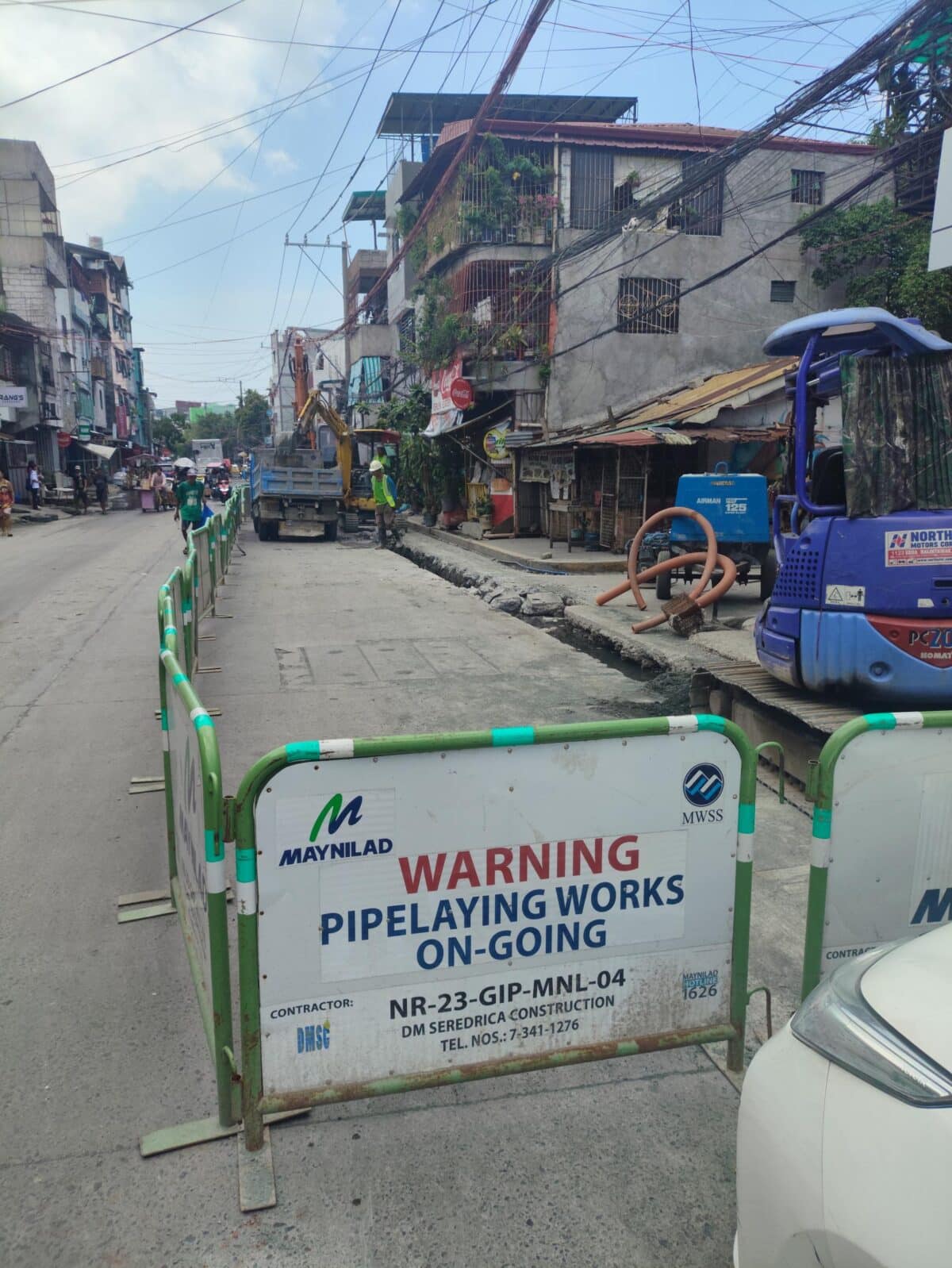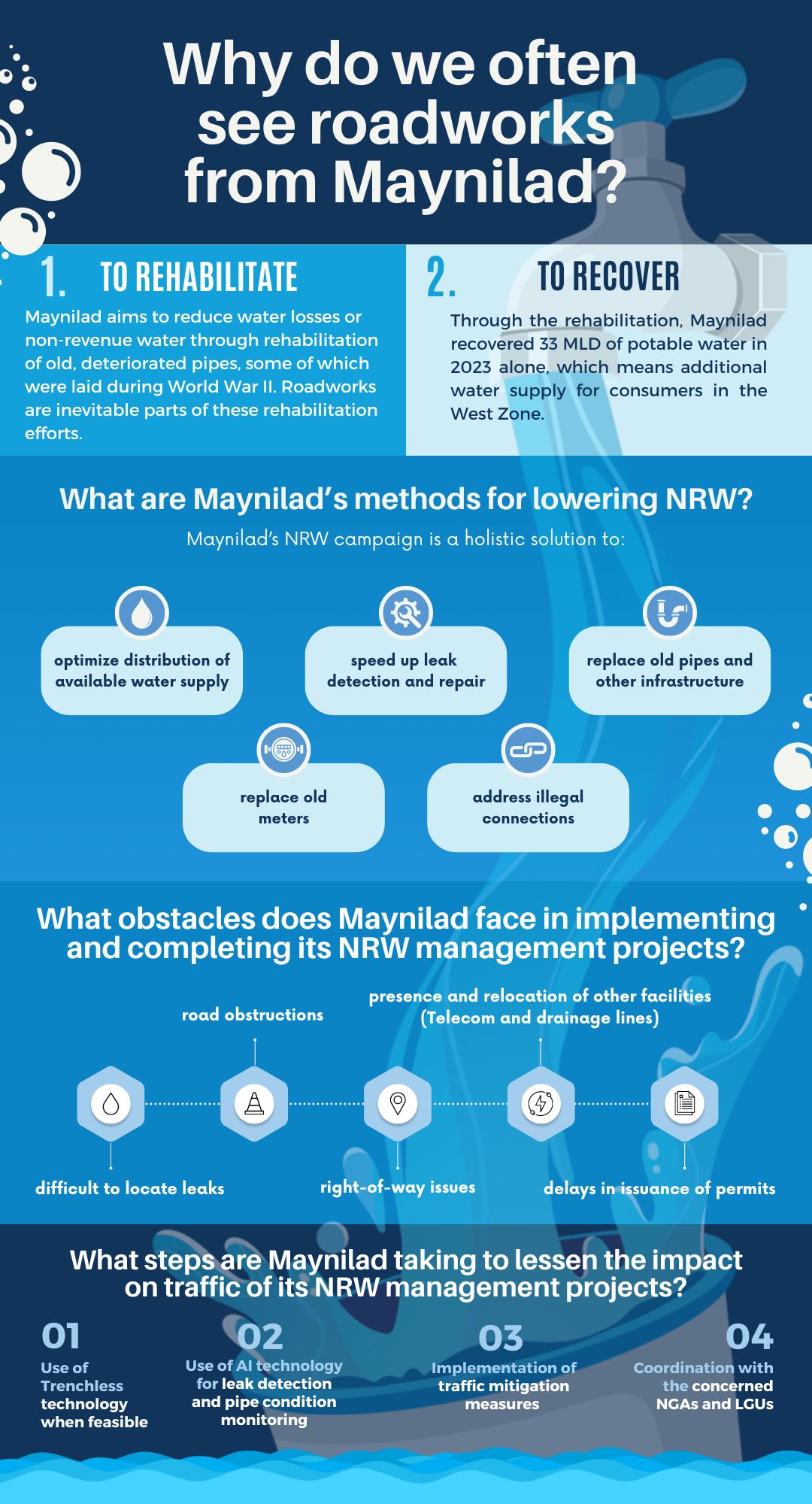
For a developing country like the Philippines, access to safe water remains a major concern, with 42% of the country’s population still lacking reliable access to potable water. This is where Maynilad Water Services, Inc. (Maynilad) comes in. The largest water concessionaire in terms of customer base in the Philippines with over 1.5 million water service connections, Maynilad commits to provide safe, affordable, and sustainable water solutions for communities.

As part of its commitment to optimize water management, enhance service quality, and contribute to a more sustainable and resilient water utility sector, Maynilad further bolstered its non-revenue water (NRW) management program. This is a long-term and continuing program that aims to mitigate “water losses”, that arise from physical (such as pipe leaks) and commercial losses (including illegal connections, unauthorized withdrawal from fire hydrants, and meter under-registration, among other factors).

Reducing water losses and keeping it within acceptable levels involve major roadworks, as old and deteriorated pipelines have to be dug out and replaced. The company allocated Php26 billion for capital expenditure projects from 2023 to 2027 aimed specifically at reducing NRW and boosting water recovery. Prior to that period (especially since re-privatization), the company had already been investing heavily in NRW management, especially since Maynilad inherited the older section of MWSS pipelines, including those that were laid during World War II.
In line with its service enhancement goal, the company is facilitating several pipe replacement and leak repair activities in different areas across its concession area. These operations could mean traffic congestion, delays, and a myriad of other inconveniences for commuters and motorists; thus, Maynilad wishes to address all concerns in connection with its roadworks, particularly those that are being implemented to help reduce water losses:
- Why do we often see roadworks from Maynilad?
Roadworks are inevitable parts of Maynilad’s rehabilitation efforts. Underground assets like water pipelines deteriorate with age and use, so these need to be maintained or replaced when necessary. It’s all part of the effort to maintain a resilient water infrastructure that is designed to meet the supply requirements of consumers.
Since the re-privatization of Maynilad in 2007, it has already repaired 458,000 pipe leaks and replaced 3,155 kilometers, enabling it to renew 68% of the pipe network it inherited from the government. In 2023 alone, the water company spent around Php3 billion to replace 143 kilometers of old pipelines (which were older than 15 years) that are mostly located in Caloocan, Valenzuela, Pasay, and Bacoor City in Cavite. This replacement allowed Maynilad to recover around 67 MLD (million liters per day) of potable water supply, helping to boost pressure in the network and ultimately leading to improved service levels for some 200,000 customers.
Maynilad aims to replace 78% of these old, inherited pipes by 2027. There is still a lot of rehabilitation to be done, and the company is not letting up in its efforts to tighten the network and recover more water supply.
Chronic water losses have been a trademark of urban Asia’s water management over the years. The rapid growth of Asia’s towns and cities—coupled with increased volumes of water for irrigated agriculture, energy, and industry—has meant that there is much less water to go around in the urban centers. The losses of an estimated 29 billion cubic meters of treated water every year, valued conservatively at $9 billion, is no longer something that Asia’s urban water managers can ignore.
In the West concession, Maynilad has already managed to significantly bring down NRW since re-privatization in 2007, but it acknowledges that the war against water losses is far from over. To sustain its NRW reduction momentum, Maynilad aims to repair 40,000 more pipe leaks across its service area and replace 200 kilometers of old pipes in 2024 in parts of Caloocan, Quezon City, Valenzuela, Malabon, Manila, Parañaque, Las Piñas, and Muntinlupa in Metro Manila, as well as in Imus and Kawit in Cavite province.
- How will NRW reduction improve the state of water management in the areas covered by Maynilad?
Around 80% to 90% of NRW is physical or is due to leakages. Plugging the leaks leads to an improvement in water pressure. A tighter pipe network allows Maynilad to have better control of supply and pressure, which is crucial during times when supply is limited and Maynilad has to manage water flow for optimal distribution.
NRW reduction initiatives also contribute to the conservation of water resources. This means less raw water is extracted, preserving natural water bodies and ecosystems.
Maintenance of assets is a key driver of NRW reduction. Effective asset management practices ensure the longevity and reliability of the water supply infrastructure. By prioritizing maintenance, monitoring, and strategic investments, water utilities can minimize asset failures, thereby improving operational efficiency and service delivery.
Ultimately, by recovering the water that is lost through leaks and illegal connections, Maynilad’s NRW management initiatives ensure that existing resources are efficiently utilized and that there will be enough water supply for all connected households and establishments.
- How long do these projects take to complete?
Water system rehabilitation efforts are part of Maynilad’s service enhancement, and the length of time it will take to complete depends on various factors, including how fast underground leaks can be detected, the movement of facilities and equipment, presence and relocation of other facilities (like telecom lines and drainages), right-of-way issues, and road obstructions. Apart from the fact that installation and repair itself certainly take time, rehabilitation efforts also depend largely on permit issuance by the government.
Another factor that extends project completion timelines is the need to subject newly laid pipes to hydrotesting (or hydrostatic testing). This is a quality control procedure performed to determine the structural integrity of pipelines, providing assurance that pipes can withstand duress. However, hydrotesting can oftentimes be time-consuming, as it is a labor-intensive process that requires specialized equipment and skilled personnel. Nevertheless, it is an essential step in the pipe-laying process, and the permanent road restoration can only commence once the new pipe segment passes the test.
- Why do some road restorations seem of substandard quality?
Trenches made on roads to accommodate pipe replacements and pipe-laying activities are not immediately restored because the newly laid pipes still have to undergo hydrotesting. What motorists assume to be “substandard quality restorations” are actually just temporary restorations, which are done to make the road passable to motorists as the hydrotesting continues.
Once the pipe segment passes the hydrotest, the backfill will be poured into the trench and this backfill will be subject to a field density test (FDT) to ensure compactness and quality. This phase may be delayed if it rains because FDT cannot be undertaken on wet soil and the trench will have to be left partially open to dry. But once the backfill passes FDT, the pouring of concrete will commence. Drying out the concrete may take a few more days, depending on site conditions.
The road is restored according to its previous type (i.e., concrete or asphalt). Tests for concrete compressive strength are carried out by DPWH-accredited laboratories to ensure the quality of the restoration. Affected roads are also inspected by Maynilad prior to project acceptance.
- What is Maynilad doing to mitigate the impact of its rehabilitation efforts?
One of the ways by which Maynilad promotes seamless traffic flow and avoids buildup near its worksite is to use trenchless technology. This is a construction or excavation method that involves the installation of pliable but sturdy pipes via insertion points, thus removing the need to dig a trench to lay pipelines.
Of course, the trenchless method is not always applicable for implementation in certain areas, so when the project involves major road diggings, Maynilad partners with local officials and relevant agencies, and also deploys its own traffic aides to manage traffic flow along its worksites. The company also limits its major pipe replacement and repair works to nighttime hours when there is less traffic on the roads and covers open trenches at daytime to make the road passable to motorists.
In line with maintaining underground assets to help minimize roadworks, Maynilad has also begun piloting artificial intelligence (AI) use for leak detection and pipe condition monitoring. It uses Infrawise to identify areas in its water distribution system with a high likelihood of leaks, thus enabling the company to detect pipe leaks more quickly and efficiently. The Infrawise software analyzes and identifies critical areas in the pipe network where Maynilad should focus its leak detection and pipe replacement activities. After the pilot run in October 2023, the AI software has already produced a map that identified vulnerabilities over 750 kilometers of pipelines, which later resulted in the positive identification of 2,053 leaks. This technology has enabled Maynilad to proactively identify and address potential leaks in pipe networks more efficiently, equating to water conservation and enhanced service reliability to consumers.
Maynilad has also tapped Asterra, a satellite-based infrastructure intelligence company that uses imagery and AI to detect underground leaks. Its use involves applying algorithmic analysis to track the spectral “signature” of potable water underground captured in a satellite image. During its year-long pilot use of Asterra’s technology, Maynilad is examining 1,000 kilometers of its primary lines across the West Concession area and actively looking for possible leaks.
- What can we as pedestrians, motoring public, and Maynilad customers do to help?
Constantly check for leaks, starting from your water meter leading to all pipes in the house, and immediately call your plumber if you find a leak. Make sure your pipes are rust-free to guarantee clean water, as Maynilad is constant and current in treating and testing its water supply. Encourage your friends and community to actively participate in the water recovery effort by reporting pipe leaks, illegal connections, and illegal withdrawals from fire hydrants. You may also lobby your local government for the fast issuance of permits and assistance in the facilitation of Maynilad’s NRW projects.
To report leaks and other concerns, simply call the Maynilad Hotline 1626. You may also send a message through its text line 0998-8641446 or its official social media channel on Facebook and answer the contactless form or all your Customer Care needs. For additional questions, visit its website.
INQUIRER.net BrandRoom/JC

